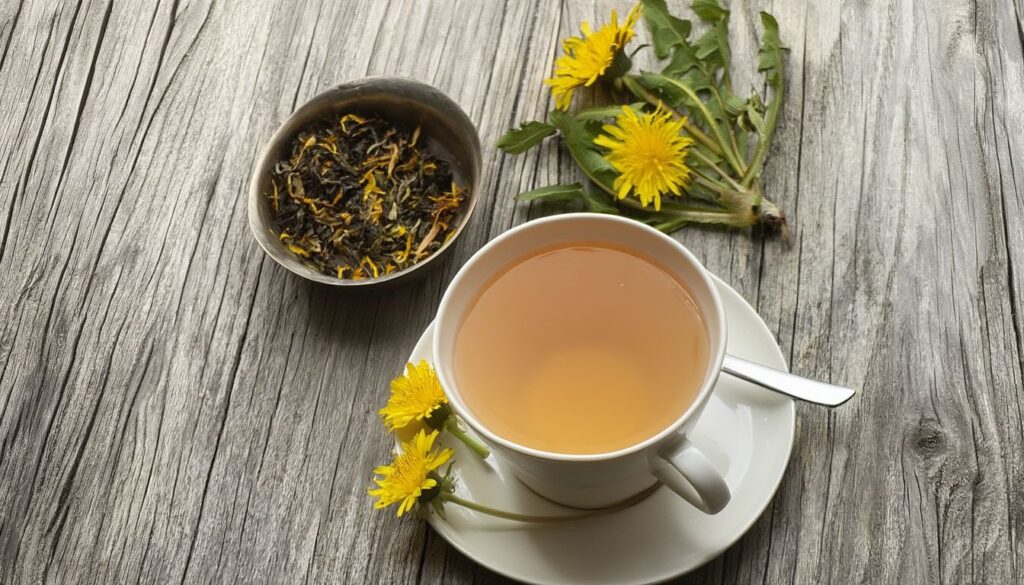Dandelion root has a long history of medicinal use. This herb supports liver health, combats inflammation, and helps reduce blood sugar and cholesterol levels. Rich in nutrients, dandelion root provides a variety of health benefits.
Dandelion root provides antioxidants and delivers several vitamins and minerals, including vitamin C, vitamin A, iron, and calcium. People have used it as a natural remedy for many ailments, including digestive issues, skin problems, and joint pain. Researchers also suggest that dandelion root may offer anticancer effects.
Overall, dandelion root serves as a versatile herb that supports health and wellness in many ways. You can drink it as a tea, take it in supplement form, or add it to your meals. Incorporating dandelion root into your routine may provide numerous health benefits.
Dandelion Root Overview – Get Your Dandelion Root Here
As a naturopath, I have come across many plants that have been used for centuries in traditional medicine. One such plant is the dandelion (Taraxacum officinale), which is known for its medicinal properties. In this section, I will provide an overview of dandelion roots and their historical use in traditional medicine.
Botanical Profile
Dandelion grows as a perennial herbaceous plant in the Asteraceae family. It originates in Europe but now thrives in many parts of the world. The plant develops a long taproot that extends up to 30 cm. Its basal leaves form deep lobes, and its bright yellow flowers bloom on hollow stems that rise to 50 cm. The plant blooms in spring and summer and produces fluffy seed heads that the wind disperses.
Dandelion root forms the underground part of the plant. It appears brown in color and carries a bitter taste. Harvesters collect the root in fall or spring and dry it for later use. Dandelion root provides beneficial compounds such as sesquiterpene lactones, phenolic acids, flavonoids, and polysaccharides.
Historical Use in Traditional Medicine
People have used dandelion root in traditional medicine for centuries. The ancient Egyptians, Greeks, and Romans relied on it for its medicinal properties. Practitioners of traditional Chinese medicine use dandelion root to treat digestive disorders such as constipation, bloating, and diarrhea. Ayurvedic medicine now applies dandelion root to treat liver and gallbladder problems.
Western herbalists use dandelion root as a diuretic to increase urine production and as a liver tonic to improve liver function. They also treat skin disorders such as acne, eczema, and psoriasis with it. Herbalists believe the bitter compounds in dandelion root stimulate the digestive system and increase bile production, which breaks down fats and removes toxins from the body.
Dandelion root carries a long history of use in traditional medicine. Its beneficial compounds make it a valuable herb for many health conditions. In the next section, I will discuss the potential health benefits of dandelion root in more detail.
Nutritional Composition
Dandelion root is a rich source of vitamins and minerals that are essential for maintaining overall health. It contains high amounts of potassium, calcium, magnesium, and iron, which are all important for maintaining healthy bones, muscles, and nerves.
Vitamins and Minerals Content – Dandelion Root Benefits
Dandelion root is an excellent source of vitamin K, which is essential for blood clotting and bone health. A 100-gram serving of raw dandelion root contains approximately 650 micrograms of vitamin K, which is more than the recommended daily intake for adults. It is also a good source of vitamin C, which helps to boost the immune system and protect the body against diseases.
In addition, dandelion root is rich in other vitamins, including vitamin A, vitamin E, and vitamin B-complex. These vitamins play important roles in maintaining healthy skin, hair, and nails, as well as supporting the body’s metabolism and energy production.
Antioxidant Properties
Dandelion root delivers strong antioxidant properties that protect the body against damage from free radicals. These harmful molecules damage cells and raise the risk of chronic diseases such as cancer and heart disease.
This plant provides several antioxidants, including beta‑carotene, lutein, and zeaxanthin. These antioxidants neutralize free radicals and lower the risk of oxidative stress.
Overall, dandelion root offers a highly nutritious food that supplies a wide range of vitamins, minerals, and antioxidants. Adding it to your diet improves overall health and well‑being.
Health Benefits – Get Your Dandelion Root Here

As a nutritional powerhouse, dandelion root offers a range of health benefits. Here are some of the most notable:
Supporting Liver Health
Dandelion root has traditionally been used to support liver health. Studies suggest that it may help to improve liver function and protect against liver damage caused by toxins. Dandelion root contains compounds that support liver detoxification and promote the production of bile, which helps to break down fats and eliminate waste from the body.
Regulating Blood Sugar Levels
Dandelion root may also help to regulate blood sugar levels. Studies suggest that it may help to lower blood sugar levels in people with type 2 diabetes. Dandelion root contains compounds that improve insulin sensitivity and promote the uptake of glucose by cells. This can help to prevent spikes in blood sugar levels and reduce the risk of complications associated with diabetes.
Anti-Inflammatory Effects
Dandelion root has anti-inflammatory effects that may help to reduce inflammation throughout the body. Studies suggest that it may help to reduce inflammation in conditions such as arthritis and asthma. Dandelion root contains compounds that inhibit the production of inflammatory cytokines and promote the production of anti-inflammatory cytokines.
Aiding Digestion
Dandelion root may also aid digestion by promoting the production of digestive enzymes and improving gut motility. Studies suggest that it may help to relieve symptoms of constipation, bloating, and other digestive issues. Dandelion root contains compounds that stimulate the production of gastric acid and bile, which help to break down food and eliminate waste from the body.
Boosting the Immune System
Dandelion root may also help to boost the immune system by promoting the production of white blood cells and activating immune cells. Studies suggest that it may help to reduce the risk of infections and improve the body’s ability to fight off pathogens.
Dandelion root contains compounds that have antimicrobial and antiviral properties, which can help to prevent and treat infections. Overall, dandelion root offers a range of health benefits that make it a valuable addition to any diet.
Potential Therapeutic Uses
Dandelion root has been used for centuries as a traditional medicine for various ailments. Recent studies have shown that dandelion root may have potential therapeutic uses for several health conditions. In this section, I will discuss some of the potential therapeutic uses of dandelion root.
Cancer Prevention and Treatment – Dandelion Root Benefits
Researchers have found that dandelion root carries anti‑cancer properties. A study published in the International Journal of Oncology reports that dandelion root extract induces apoptosis (programmed cell death) in cancer cells. The extract also inhibits the growth of breast cancer cells. These findings suggest that dandelion root may serve as a potential natural cancer treatment.
Diabetes Management
Dandelion root has been found to have anti-diabetic properties. According to a study published in the Journal of Ethnopharmacology, dandelion root extract was found to lower blood glucose levels in diabetic mice. Dandelion root has also been found to improve insulin sensitivity and reduce insulin resistance. These findings suggest that dandelion root may have potential as a natural diabetes treatment.
Heart and Blood Pressure Health
Dandelion root has been found to have potential benefits for heart and blood pressure health. According to a study published in the Journal of Herbal Pharmacotherapy, dandelion root extract was found to have anti-inflammatory and antioxidant properties, which may help reduce the risk of heart disease. Dandelion root has also been found to have a diuretic effect, which may help lower blood pressure.
Skin Health and Healing
Dandelion root has been found to have potential benefits for skin health and healing. According to a study published in the International Journal of Molecular Sciences, dandelion root extract was found to have antioxidant and anti-inflammatory properties, which may help protect the skin from damage and promote healing. Dandelion root has also been found to have potential benefits for wound healing.
The potential therapeutic uses of dandelion root are promising. However, more research is needed to fully understand the mechanisms behind these potential benefits and to determine the optimal dose and duration of treatment.
Dandelion Root as a Diuretic – Get Your Dandelion Root Here
As a natural diuretic, people have used dandelion root for centuries to increase urine production and flush out excess water and waste from the body. Verywell Health reports that dandelion root increases urine output by promoting the excretion of sodium and water from the kidneys, which reduces bloating and swelling.
In addition to its diuretic properties, dandelion root may also benefit individuals with kidney disease. Dr Axe explains that dandelion root improves kidney function by increasing urine output and lowering the amount of protein in the urine. Researchers still need to study its effects further to fully understand how dandelion root influences kidney health.
Overall, while dandelion root may have potential benefits as a natural diuretic and for individuals with kidney disease, it is important to consult with a healthcare professional before incorporating dandelion root into your diet or supplement regimen.
Incorporating Dandelion Root

Dandelion root can be incorporated into your diet in various ways. Here are a few ways to include dandelion root in your daily routine:
Dandelion Root Tea and Beverages – Dandelion Root Benefits
Dandelion root tea offers a popular way to consume dandelion root. You can buy pre‑made tea bags or steep dried dandelion root in hot water for 5–10 minutes to make your own. The tea carries a slightly bitter taste, and you can balance it with a little honey or lemon juice.
In addition to tea, you can add dandelion root to smoothies or other beverages. Blend fresh or dried dandelion root into your favorite drink to give it a nutrient boost.
Supplements and Dosage Recommendations
Dandelion root supplements are available in various forms, including capsules, tinctures, and powders. When choosing a supplement, make sure to read the label carefully to ensure that it contains pure dandelion root extract.
The recommended dosage of dandelion root supplements varies depending on the form and concentration. It is always best to consult with a healthcare professional before starting any new supplement regimen.
Culinary Uses: Salads and More
Cooks use dandelion greens and roots in a variety of culinary dishes. You can add dandelion greens to salads or sauté them with other vegetables as a side dish. You can roast dandelion roots and use them as a coffee substitute or add them to soups and stews for extra flavor.
Remember that dandelion greens and roots taste bitter, so start with small amounts and adjust to your preferences.
Incorporating dandelion roots into your daily routine provides various health benefits. You can drink dandelion root tea, take supplements, or add the root to your meals. Dandelion root serves as a versatile and nutrient‑dense ingredient that supports overall health and well‑being.
Safety and Side Effects – Get Your Dandelion Root Benefits Here
As with any supplement, it is important to be aware of the potential side effects and risks associated with consuming dandelion root.
Allergic Reactions and Interactions
Most people tolerate dandelion root well, but some individuals experience allergic reactions. Symptoms include hives, itching, and difficulty breathing. If you develop any of these symptoms after consuming dandelion root, seek medical attention immediately.
Dandelion root also interacts with certain medications, including blood thinners and lithium. If you take any medications, consult your healthcare provider before you add dandelion root to your diet.
Contraindications and Risks
Dandelion root does not suit everyone. Pregnant and breastfeeding women should avoid consuming it because researchers have not studied its safety in these populations.
Additionally, individuals with certain medical conditions, such as gallbladder disease or kidney problems, should also avoid consuming dandelion root. The root increases the risk of bleeding in people with bleeding disorders.
These risks generally occur when people consume large amounts of dandelion root. When taken in moderation, most people tolerate it safely.
Dandelion root offers numerous potential health benefits, but you need to stay aware of the possible side effects and risks. If you plan to add dandelion root to your diet, speak with your healthcare provider to confirm it is safe for you.
Before You Go – Dandelion Root Benefits: A Weed or a Wonder Plant

Dandelion root has earned its place in traditional medicine for centuries, offering potential support for digestion, liver health, and overall wellness. Modern research continues to explore its antioxidant and anti‑inflammatory properties, making it a fascinating herb for those seeking natural approaches to health.
As with any supplement, use dandelion root thoughtfully. Speak with a healthcare professional before adding it to your routine, especially if you take medications or have existing health conditions. Choosing high‑quality products and consuming them in moderation ensures you gain the benefits while staying safe.
Whether you’re interested in detox support, improved digestion, or simply exploring herbal remedies, dandelion root provides a gentle yet powerful option rooted in nature’s wisdom.
Don’t forget to add theherbprof.com homepage to your favourites so you don’t miss out on future articles!
References – Dandelion Root Benefits: A Weed or a Wonder Plant
Little Herb Encyclopedia, by Jack Ritchason; N.D., Woodland Publishing Incorporated, 1995
The Ultimate Healing System, Course Manual, Copyright 1985, Don Lepore
Planetary Herbology, Michael Tierra, C.A., N.D., Lotus Press, 1988
Handbook of Medicinal Herbs, by James A. Duke, Pub. CRP Second Edition 2007
The Complete Medicinal Herbal, by Penelope Ody, Published by Dorling Kindersley
Check the Following Articles
Cayenne Pepper Benefits: Amazing Health Advantages
Discover Chlorella: Powerful Uses and Health Benefits
Corn Silk Benefits: A Natural Fiber Rich in Antioxidants
Damiana Benefits: The Amazing Herb With Energy Boost
Frequently Asked Questions – Dandelion Root Benefits: A Weed or a Wonder Plant
What are the potential benefits of taking dandelion root for the skin?
Dandelion root provides antioxidants that protect skin cells against damage from free radicals and slow down the signs of ageing. The root also delivers anti‑inflammatory properties that reduce skin irritation and improve conditions such as acne, eczema, and psoriasis.
How may dandelion root tea contribute to overall health?
People have used dandelion root tea for centuries as a natural remedy for many ailments. The tea supports liver and kidney function, aids digestion, and reduces inflammation. It also supplies vitamins and minerals, including vitamin C, vitamin K, and potassium, which strengthen overall health.
Can dandelion root aid in natural detoxification processes?
Yes, dandelion root supports liver function, which plays a key role in the body’s natural detoxification. The root contains compounds that stimulate bile production, a substance that removes toxins and waste from the body.
What are the implications of consuming dandelion root for heart health?
Dandelion root benefits heart health by lowering blood pressure, reducing inflammation, and improving cholesterol levels. These effects reduce the risk of heart disease and other cardiovascular conditions.
Are there any notable side effects associated with dandelion root consumption?
Most people tolerate dandelion root well, but some experience side effects such as upset stomach, diarrhea, or allergic reactions. People with medical conditions such as gallbladder disease or diabetes should use caution when consuming dandelion root.
Does incorporating dandelion root into your diet help with weight management?
Research on dandelion root and weight management remains limited, but some studies show that the root acts as a diuretic, which reduces water weight. Dandelion root tea also promotes feelings of fullness and reduces cravings, which may aid weight loss efforts. Researchers still need to study its effects further to confirm these potential benefits.
